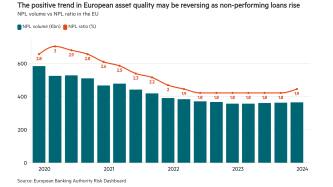In an election year, expectations were running high on how much wiggle room UK chancellor Jeremy Hunt would find in the public finances to provide relief for those hit hardest by the cost of living crisis, and to keep the UK’s green investment agenda, which has suffered recent setbacks, on track.
While some welcomed the announcement of the extension of the recovery loan schemes and the raising of the VAT threshold from £85,000 to £90,000, critical areas for small and medium-sized enterprises remain unaddressed, said Andrew Martin, founder of SMEB, which provides banking services to small businesses.
“There is great concern about access to banking services — which is not filled by the government’s Access to Cash programme,” said Martin. “Private industry will need to plug the gaps left by today’s actions.”
Despite announcing a £10bn cut in national insurance, Nigel Green, CEO of financial advisory and asset management company deVere Group, said the tax burden in the UK is set to reach the highest levels in 70 years as the personal allowance — the amount people can earn before starting to pay tax — and the thresholds for the higher and additional rates of tax, were frozen again.
Silvia Galandini, Oxfam’s domestic poverty lead, said the budget was another “missed opportunity” to take the ambitious action needed to tackle poverty and narrow the gulf between the richest and poorest.
She said ending “non-dom” tax status and a temporary extension of the oil and gas windfall tax, as well as small amounts of extra money for childcare and some people receiving benefits are welcome, but do not go nearly far enough to create an economy that works for everyone and not just a small few.
“Instead, the government should have raised taxes on the wealthiest people and companies to fund essential services, like childcare and social care, strengthen the social security safety net, and properly invest in people and our planet.”
Green industries
Despite Prime Minister Rishi Sunak making a series of U-turns in recent months on key green targets such as phasing out of petrol and diesel cars, and a damning report recently issued by the UK Sustainable Investment and Finance Association, showing that the UK is falling behind other countries in the international race to become the most investable market for low-carbon energy, green industries did get a look in.
The Budget announced details of increased funding for the Green Industries Growth Accelerator, with its budget increasing by up to £120mn to further support expansion of low-carbon manufacturing supply chains across the UK.
Up to £390mn of the GIGA funding is expected to go to supply chains for offshore wind and electricity networks, and up to £390mn is earmarked for supply chains for carbon capture utilisation and storage and hydrogen. This sits alongside the £300mn already allocated to nuclear fuels for the High-Assay Low-Enriched Uranium programme.
The government has published full parameters for the “contracts for difference” allocation round 6, including setting the largest-ever budget for a single round, of over £1bn.
However, in its recent report, UKSIF said unless more favourable policies — reducing the time it takes for major energy projects to be approved, and ensuring adequate grid capacity to reduce connection times — were put in place, the UK could miss out on a potential £115bn of private capital waiting to be deployed by energy companies into existing or new sustainable/green projects in the UK.
The Spring Budget did include announcements around electricity grid reform, a new, accelerated planning service as well as measures to speed up the consenting process for “nationally significant infrastructure projects”.
It also talked about bringing trades in carbon credits within the scope of the VAT Terminal Markets Order to enable further reform. Mark McKay, managing director at consultancy Alvarez & Marsal, said the carbon credit consultation announced by the chancellor opens the door to non-regulated carbon credit sales falling within the scope of VAT.
“This will benefit investment funds and traders in non-regulated carbon credits — ‘voluntary credits’ — as it is expected to allow them to recover more VAT and also would deal with the uncertainty in the law between regulated and non-regulated trades,” he said.
But others were expecting more concrete details to be revealed in the Budget about the government’s plans to bring providers of environmental, social and governance ratings under the regulatory purview of the Financial Conduct Authority.
Lorraine Johnston, head of ESG regulation at law firm Ashurst, said the “holding statement” from the government in the Spring Budget is somewhat disappointing given that the consultation closed last summer.
“What industry is really looking for is the clarification around what will constitute an ESG rating and who will be in scope as an ESG rating provider for such ESG ratings,” she said. “What constitutes exclusions or exemptions will be absolutely key in this area. Without such clarification, it remains a waiting game for industry.”













